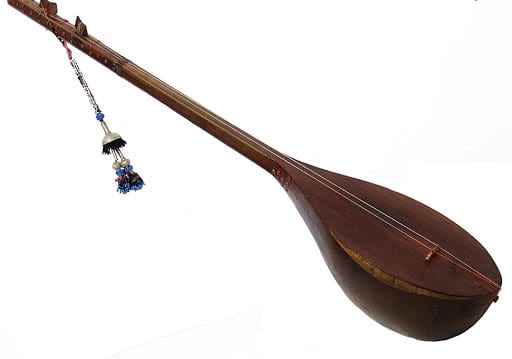Mohamadreza Eshaghi: is one of the most important masters of regional music from northeastern Mazandaran, Iran.
He is a player of the Mazandaran Dotar, a singer, poet, and composer. He was born in November 1947 in Gorji Mahalleh, near Behshahr, Mazandaran, in northern Iran. Mohammadreza learned to play the Dotar from his mother during his childhood.
The term “Minstrel“
The Minstrel refers to musicians who would narrate heroic, mythological, or romantic tales through song, often crafting melodies and playing them while singing. These minstrels were solo performers and played a vital role in preserving and spreading intangible cultural heritage across ancient civilizations.
Mohammadreza Esheghai has a deep connection with the ancient tradition of the minstrel (خنیاگر). From his teenage years, he embarked on numerous searches to collect the ancient tales of the northern Iranian peoples.
Many of these epics were incomplete, reflecting the gradual loss of cultural memory over time. Mohammadreza diligently gathered these fragments and, through his poetic talents, reconstructed entire stories based on the remaining verses. For instance, in a 400-verse epic, he might have only heard 10 lines from the original storyteller, but he would creatively restore the rest.
Thanks to Mohammadreza Esheghai, many of these traditional stories are now known to the Mazandaran community.
body {
overflow-x: hidden;
}
The Mazandaran Dotar
The Mazandaran Dotar is similar in structure to the Turkmen dotar. However, its body is slightly elongated.
As Mohammadreza Esheghai describes it, “If the body of the Turkmen Dotar resembles a pear, the Mazandaran dotar resembles a fish.” The Dotar is a two-stringed instrument popular across Central Asia and Iran, including Afghanistan, Tajikistan, Uzbekistan, and Iran. It is generally made from mulberry or apricot wood, with the strings traditionally crafted from animal gut or metal.
The Dotar is commonly used in mystic, epic, and romantic music. The Mazandaran Dotar stands out for its larger body, which gives it a more rustic sound. It is typically made with walnut or mulberry wood for the body, and beech wood for the neck.

In Mazandaran’s central and mountainous regions, the dotar is primarily a companion instrument, played alongside other instruments in ensemble performances. However, the Dotar of eastern Mazandaran, influenced by Turkmen and northern Khorasan cultures, has its distinct characteristics. It features a smaller body and narrower neck. The playing style and string arrangements differ from other regions, with the rhythm being more energetic and lively. The Dotar of eastern Mazandaran is often used in solo performances and is popular for narrating the stories of local heroes.


